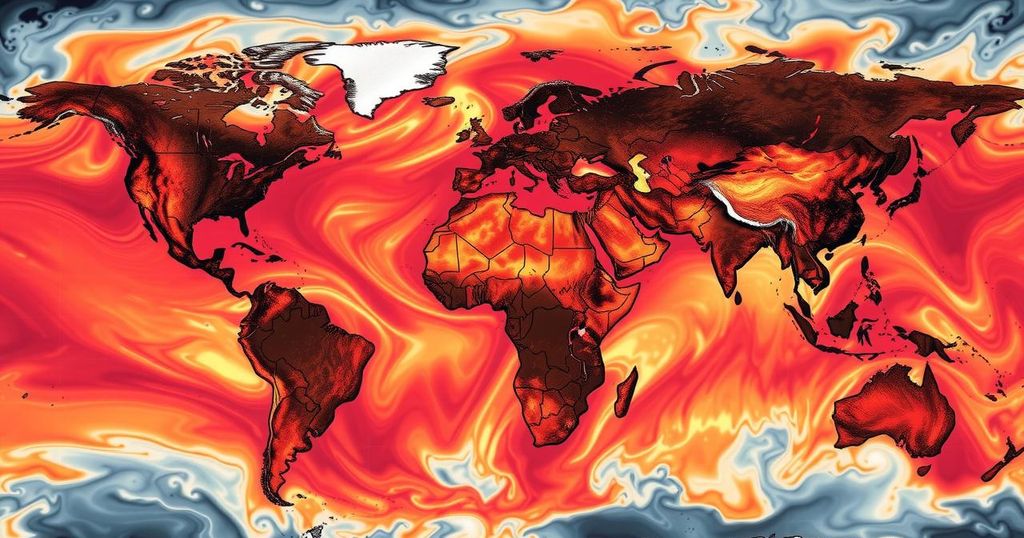In 2024, human-induced climate change contributed to an average of 41 additional days of extreme heat globally, marking the year as potentially the hottest on record and intensifying devastating weather patterns worldwide. An analysis revealed clear links between climate change and numerous extreme weather events, urging immediate action to combat escalating climate crises.
In 2024, global temperatures surged, leading to an alarming increase of 41 additional days of dangerous heat attributed to human-induced climate change. This conclusion was drawn from a collaborative analysis by researchers at World Weather Attribution and Climate Central, aligning with a year that has been marked by unprecedented climatic events. These findings underscore how climate change exacerbated various severe weather phenomena, from heat waves to droughts and tropical storms, adversely impacting communities worldwide.
The year 2024 was characterized as possibly the hottest year recorded, with many regions experiencing extreme temperatures that escalated environmental crises. Areas such as Northern California and Death Valley bore the brunt of sweltering conditions, while countries in Southern Europe faced intolerable heat, prompting significant disruptions, including closures of cultural sites and schools. The research involved comparing actual temperatures recorded this year against those expected in a stable climate, revealing stark discrepancies.
Notably, the study highlighted that the most vulnerable populations in less developed nations experienced even higher instances of extreme heat. Kristina Dahl, Vice President of Climate Science at Climate Central, illuminated this reality, stating that the least developed countries are suffering disproportionately due to climate change effects. The study also pointed out the troubling trend of underreported heat-related fatalities, emphasizing the urgent need for awareness in public health discourse around extreme heat events.
The findings serve as a forewarning regarding the earth’s ascent toward surpassing the 1.5 degrees Celsius threshold set by the Paris Agreement. With an increasing likelihood of exceeding this significant limit, the implications of ongoing global warming are profound. While the El Niño phenomenon played a role in amplifying the year’s extreme weather, researchers concluded that climate change had a more substantial influence on the severity and frequency of these events. Accordingly, the researchers scrutinized 29 deadly weather events in 2024 and established climate change links in 26 of these occurrences, underscoring the grave consequences of inaction against climate change.
Experts, including Jennifer Francis of the Woodwell Climate Research Center, corroborated the soundness of the research results, warning that extreme weather events will persist in growing frequency and intensity unless significant reductions in greenhouse gas emissions are achieved. The United Nations Environment Programme echoed these sentiments, indicating that without immediate action, the frequency of climate extremes is expected to escalate. However, Julie Arrighi, from the Red Cross Red Crescent Climate Centre, advocated for proactive measures, suggesting that countries must engage in preparedness and adaptation strategies to mitigate the effects of climate change effectively.
The analysis originates from a collaborative examination conducted by World Weather Attribution and Climate Central, focusing on the year 2024, which has continually set unprecedented heat records. Climate change poses a significant threat across various dimensions, influencing weather patterns and resulting in destructive climatic phenomena. The implications of excessive heat extend beyond discomfort, impacting public health and safety, especially among vulnerable populations. Furthermore, the study highlights the role of human activities, primarily fossil fuel combustion, in accelerating these changes and the urgent need for collective global action.
In conclusion, 2024 showcased alarming increases in dangerous heat days, largely attributable to climate change. The findings from various researchers compel global action to address the escalating consequences of climate change, particularly for vulnerable populations. As extreme weather continues to rise in frequency and intensity, the necessity for effective climate adaptation and mitigation strategies has never been more critical.
Original Source: www.detroitnews.com






